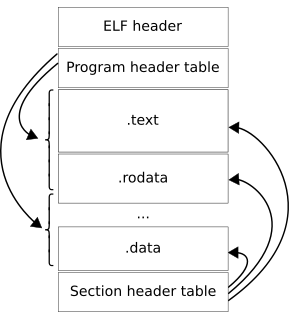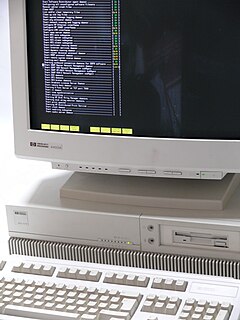
In computing, the Executable and Linkable Format, is a common standard file format for executable files, object code, shared libraries, and core dumps. First published in the specification for the application binary interface (ABI) of the Unix operating system version named System V Release 4 (SVR4), and later in the Tool Interface Standard, it was quickly accepted among different vendors of Unix systems. In 1999, it was chosen as the standard binary file format for Unix and Unix-like systems on x86 processors by the 86open project.
Darl Charles McBride is an entrepreneur and CEO of Shout TV Inc. McBride is best known as the former CEO of The SCO Group. On March 7, 2003, during McBride's tenure as CEO of the company, The SCO Group initiated litigation against IBM, alleging breach of contract and copyright infringement claims connected to Unix. The case is considered one of the top 10 technology battles of all time. SCO Group lost in a series of court battles, and was eventually forced into bankruptcy.
SCO v. IBM is a civil lawsuit in the United States District Court of Utah. The SCO Group asserted that there are legal uncertainties regarding the use of the Linux operating system due to alleged violations of IBM's Unix licenses in the development of Linux code at IBM. The lawsuit was filed in 2003, it has lingered on through the bankruptcy of SCO Group and the adverse result in SCO v. Novell, and was reopened for continued litigation by order of a new judge on June 14, 2013. Pursuant to the court order reopening the case, an IBM Motion for Summary Judgment was filed based upon the results of the Novell decision. On December 15, 2014, the judge granted most of IBM's motion, thereby narrowing the scope of the case, which remained open. On March 1, 2016, following the judge in the case ruling against the last remaining claims, SCO's suit against IBM was dismissed with prejudice; SCO then filed an appeal later that month. In February 2018, as a result of the appeal and the case being (partially) remanded to the circuit court, the parties restated their remaining claims and provided a plan to move toward final judgement.

SCO, The SCO Group, The TSG Group, Caldera Systems, and Caldera International are the various names of an American software company that became known for acquiring the Santa Cruz Operation's Server Software and Services divisions, and UnixWare and OpenServer technologies, and then, under CEO Darl McBride, pursuing a series of legal battles known as the SCO-Linux controversies.

Groklaw was a website that covered legal news of interest to the free and open source software community. Started as a law blog on May 16, 2003 by paralegal Pamela Jones ("PJ"), it covered issues such as the SCO-Linux lawsuits, the EU anti-trust case against Microsoft, and the standardization of Office Open XML.
Pamela Jones, commonly known as PJ, is the creator and was editor of Groklaw, a website that covered legal news of interest to the free and open-source software community. Jones is an Open Source advocate who previously trained and worked as a paralegal.

UnixWare is a Unix operating system. It was originally released by Univel, a jointly owned venture of AT&T's Unix System Laboratories (USL) and Novell. It was then taken over by Novell. Via Santa Cruz Operation (SCO) it went on to Caldera Systems, Caldera International, and The SCO Group before it was sold to UnXis. UnixWare is typically deployed as a server rather than a desktop. Binary distributions of UnixWare are available for x86 architecture computers. UnixWare is primarily marketed as server operating system.

UNIX System V is one of the first commercial versions of the Unix operating system. It was originally developed by AT&T and first released in 1983. Four major versions of System V were released, numbered 1, 2, 3, and 4. System V Release 4, or SVR4, was commercially the most successful version, being the result of an effort, marketed as "Unix System Unification", which solicited the collaboration of the major Unix vendors. It was the source of several common commercial Unix features. System V is sometimes abbreviated to SysV.
The SCO–Linux disputes are a series of legal and public disputes between the software company SCO Group (SCO) and various Linux vendors and users. The SCO Group alleges that its license agreements with IBM means that source code that IBM wrote and donated to be incorporated into Linux was added in violation of SCO's contractual rights. Members of the Linux community disagree with SCO's claims; IBM, Novell and Red Hat have ongoing claims against SCO.
SCOsource is a business division of The SCO Group that manages its Unix intellectual property. The term SCOsource is often used for SCO's licensing program that allows corporate users of Linux to buy licenses to proprietary Unix technology that SCO claims exists in the Linux operating system. A single CPU license costs $699 (USD).
Lineo was a thin client and embedded systems company spun out of Caldera Thin Clients by 20 July 1999.

Bradley M. Kuhn is a free software activist from the United States.

Project Monterey was an attempt to build a single Unix operating system that ran across a variety of 32-bit and 64-bit platforms, as well as supporting multi-processing. Announced in October 1998, several Unix vendors were involved; IBM provided POWER and PowerPC support from AIX, Santa Cruz Operation (SCO) provided IA-32 support, and Sequent added multi-processing (MP) support from their DYNIX/ptx system. Intel Corporation provided expertise and ISV development funding for porting to the new IA-64 platform, which had not yet been released at that time. The focus of the project was to create an enterprise-class UNIX for the IA-64, which at the time was expected to eventually dominate the UNIX server market.

Arachne is a discontinued Internet suite containing a graphical web browser, email client, and dialer. Originally, Arachne was developed by Michal Polák under his xChaos label, a name he later changed into Arachne Labs. It was written in C and compiled using Borland C++ 3.1. Arachne has since been released under the GPL as Arachne GPL.
A caldera is a volcanic feature formed by the collapse of land following a volcanic eruption.
Caldera OpenLinux (COL) is a defunct Linux distribution that was originally introduced by Caldera in 1997 based on the German LST Power Linux distribution, and then taken over and further developed by Caldera Systems since 1998. A successor to the Caldera Network Desktop put together by Caldera since 1995, OpenLinux was an early "business-oriented distribution" and foreshadowed the direction of developments that came to most other distributions and the Linux community generally.
Smallfoot is the name of both a Rapid application development toolkit and an embedded operating system designed and released by Caldera Systems/Caldera International/The SCO Group in both UnixWare and Linux formats. Created for use in embedded environments such as point of sale systems and gaming, the toolkits are used to create specifically tailored operating systems geared towards the desired use. These customized and stripped down versions of the operating systems make less of a footprint, hence the names Smallfoot embedded UNIX and Smallfoot embedded Linux respectively.
SCO Skunkware, often referred to as simply "Skunkware", is a collection of open-source software projects ported, compiled, and packaged for free redistribution on SCO operating environments. SCO Skunkware packaged components exist for SCO Xenix, SCO UNIX, SCO OpenServer 5, SCO OpenServer 6, UnixWare 2, Caldera OpenLinux, Open UNIX 8, and UnixWare 7. SCO Skunkware was an early pioneering effort to bring open source software into the realm of business computing and, as such, provided an important initial impetus to the acceptance and adoption of open source software in the small and medium business market. An extensive SCO Skunkware download area has been maintained since 1993 and SCO Skunkware components were shipped with operating system distributions as far back as 1983 when Xenix for the IBM XT was released by The Santa Cruz Operation. Later additional open source distributions for operating platforms such as the FreeBSD Ports collection and the Solaris Freeware repository would lend additional momentum to the adoption of open source in the business community.
Caldera was a US-based software company founded in 1994 to develop Linux- and DOS-based operating system products.

DR-WebSpyder was a DOS web browser, mail client and operating system environment developed by Caldera UK in 1997 that was based on the DR-DOS operating system from Novell and the Arachne web browser by Michal Polák of xChaos software. It used the web browser as its principal user interface. Named Embrowser, it has also been ported to Linux in 1999 and was called Embedix Browser since 2000.









